After the inevitable 2020 break, Gate to Southwell Festival celebrated its fourteenth anniversary at a new time of the year, the first weekend of September, and on a new site. Now located to the northwest of the town just outside the village of Kirklington, the wooded parkland and adjacent lake made an ideal setting for three stages, Main, Folk and Frontier, to host a full three days of outstanding music along with a shorter evening session for those able to start their break early and arrive on Thursday.
Three acts took to the Main Stage Thursday evening, the first two, Banter and The Henry Girls, would be around for the whole weekend and make other appearances, but the third was an opening night special. Galician piper Anxo Lorenzo (main image above) with his band of guitarist, drummer and the truly adventurous Cork-based fiddler Eoghan Neff. In addition to his Gaita, the traditional pipes of Galicia, Anxo played several whistle tunes. These, from time to time, inserted an often helpful, calming influence into a set most memorable for the breakneck speed duetting between Anxo and Eoghan. The duo also took a break for Eoghan’s solo fiddle spot, though this was far from calming as he demonstrated his astounding mastery of live looping. My final notes from that evening are a suitable summary, “high energy, more whistles than expected, more electric than expected”. But, boy, did it make for a joyous start to the festival.
John Spiers was on stage three times over the weekend, opening the Friday programme on the Folk Stage with Peter Knight and closing the Main Stage on Sunday with Jon Boden. In between, he was with the Gigspanner Big Band, headlining the Main Stage on Friday evening. The Folk Stage was the only one providing cover for the audience, but, for the Knight and Spiers set, that was irrelevant as, well before the midday start time, the crowd grew out from the open-sided tent onto the surrounding grass. They were treated to a classic set from the duo, as John helpfully explained, “what we do is pick a traditional tune and take it for a walk”. Some of the walks were quite long but still seemed to be over all too soon as two master musicians combined to mesmerise the audience with their skill and inventiveness.
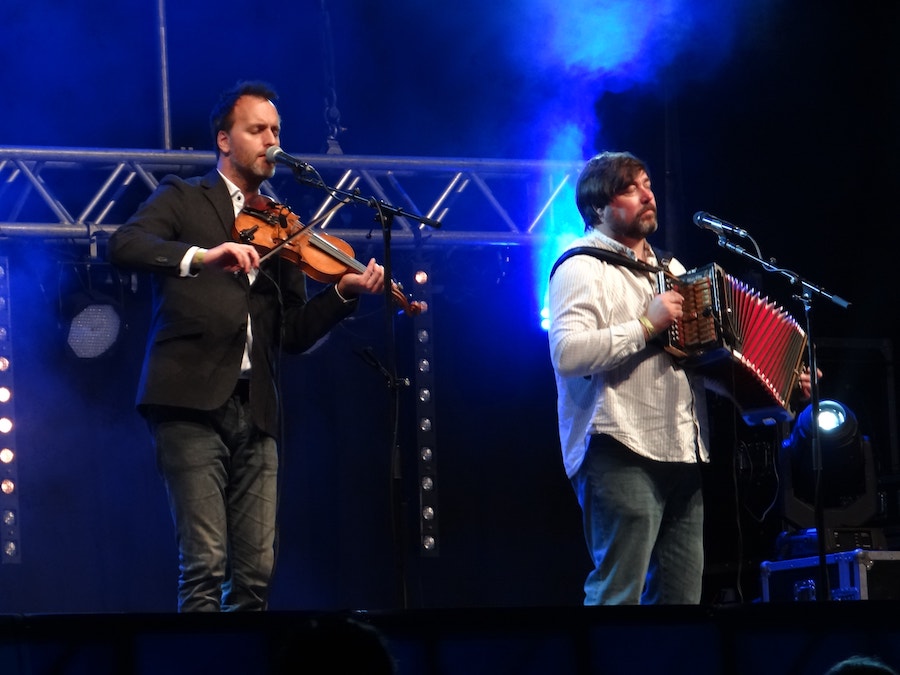
Peter and John have been able to play a few duo gigs over this summer but, when John took to the stage with Jon Boden on Sunday night, it was the first time they’d played a gig together for seven or eight years, they couldn’t quite decide which. They have, however, been together in the recording studio, and their set included many pieces from the album Fallow Ground (read the Folk Radio review/ interview), to be released later this month (17 Sept). With a generous 75 minute set, they had plenty of time to mix this new material with old favourites, songs like Tom Padget and Old Maui, and lively tunes such as Rochdale Coconut Dance. And dance the audience did, by the time they brought the set to a close with Prickle-Eye Bush, followed by New York Girls as an encore, hardly any of the audience were still in their seats, and the mosh pit was overflowing. An audience reaction almost identical to that generated by the previous act, Talisk. Scottish bands like Talisk have long come to expect this, but to see such a resolutely English pairing having that effect was a delight. Afterwards, I asked John Spiers for his reaction to getting back on stage with Jon, “it was absolutely uplifting… hearing those old sets coming out of us was almost like being in the audience listening to ourselves playing.” And he added, “I’m really chuffed with how the new material went down too”.
John’s other appearance was with the Gigspanner Big Band, and I’m confident he would have left the stage feeling similarly exhilarated after the performance they delivered. Over the last few years, the Big Band has honed their live performances to near perfection, presenting sets that entertain and intrigue in equal measure. There’s still an abundance of ensemble playing whilst the passages created by pairings within the band increasingly make the listener sit up and take notice. It’s rather like a multi-stage firework, the initial big bang from the band and then smaller explosions of sparkly magic as the pairings take centre stage. The original pairings tended to be duets from Peter and Hannah’s fiddles or Phil’s dobro and Roger’s guitar, but over time any two, or three band members come together to create these pieces within the piece. Music of the highest quality and much appreciated by the Southwell audience. Phil Henry and Hannah Martin were kept extra busy, squeezing one of their mesmerising Edgelarks sets into a Friday schedule that was already crowded for all the members of the Big Band.
In contrast to my last festival, Wickham, relatively few Scottish bands made the trip down to Southwell. I’ve already given a brief mention to Talisk for the audience reaction the trio elicited. Their appearance was also notable as they were without their regular fiddle player, Hayley Keenan. 2019’s Scottish Young Musician of the year, Benedict Morris, taking her place and demonstrating an uncanny ability to keep up with the pace set by Mohsen Amini’s concertina. Mohsen was also on stage with his other band, Ìmar, but they too had an absentee, uilleann piper Ryan Murphy had tested positive the day before and so was isolating. Inevitably, the absence of pipes, flute and whistles required some changes. Still, the remaining band members, Tom Callister on fiddle, Adam Brown on guitar and bodhrán and Adam Rhodes on bouzouki, adapted seamlessly. Both their sets leaving the audience pleading for more and prompting this comment from my wife, Jeanie. “There’s very few acts I’d watch twice at a festival, but Ìmar is certainly one”.
The remaining Scottish presence was from Edinburgh based The Jellyman’s Daughter, a rather less familiar band on the UK festival circuit but one that I’d been keen to hear since reviewing their debut album back in 2014. Then a duo, Emily Kelly (vocals and guitar) and Graham Coe (vocals and cello), have since expanded the line-up for larger gigs, whilst the duo remains as the core. For Southwell, they arrived with their frequent collaborator Jamie Francis, Graham’s banjo-playing compatriot in Sam Kelly’s Lost Boys, but without their double bassist. He was in Germany and unable to make the trip. The trio delivered an excellently varied set, opening with a country-ish song, Emily’s voice initially accompanied just by the banjo. When this was followed by a Robert Johnson blues, it was clear that little would be off-limits, and the set developed into a thoroughly enjoyable mix of arrangements, varying from bluegrass to orchestral and most points in between. They last released an album in 2018, but they’ve material ready for their next; it’s just a small matter of getting everyone together to record it. I do hope I won’t have too long to wait.
Probably the hardest working act of the weekend was The Henry Girls, appearing Thursday, Friday and Sunday on each festival stage in turn. Rather than take Saturday off, they headed into Southwell to perform a pub set. If that wasn’t enough, they also contributed to Saturday’s John Prine tribute. This was a slightly different Henry Girls from the trio I’d seen on their last visit in 2016. Younger sister Joleen is taking some time out to be with her new baby, so Karen and Lorna McLaughlin were joined by fellow Donegal native Denise Boyle. That meant no harp, but plenty of excellent mandolin, guitar and fiddle from Denise and, most importantly, her voice meshed perfectly with the two sisters. Hence, their trademark three-part harmonies were there in abundance. The sisters’ music has always been a fascinating blend of influences from Ireland and North America. Over the last couple of years, they’ve tweaked that, exploring the repertoire of 1920s and 30s close harmony trio The Boswell Sisters. This led them to make a CD, Shout Sister Shout, recorded live at the 2019 Earagail Arts Festival with accompaniment from a seven-piece jazz band. Released in early 2020, any plans for supporting tours had to be abandoned, and so Southwell was a rare opportunity for them to perform tracks from the album. They didn’t neglect their more traditional material, resulting in a blend with a winning combination of freshness and familiarity.
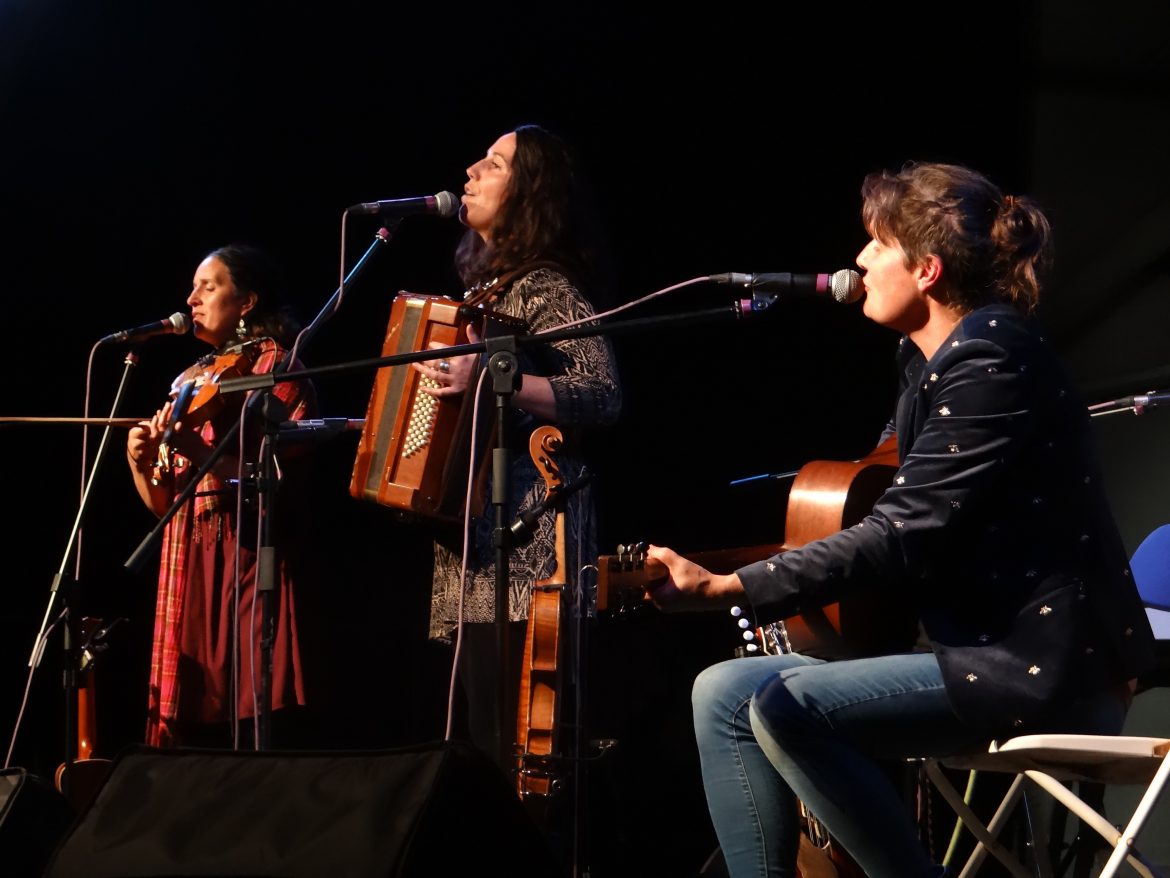
Banter are rapidly becoming something of a fixture on the UK festival scene, and reactions to their two sets at Southwell did much to cement their reputation. However, this was a new, enlarged Banter as they’ve recruited ex-Trad Arrr and Tickled Pink bass guitar and violin player Mark Jolley. In another development, the band’s keyboard player and main vocalist, Nina Zella, opened up the Folk Stage on Saturday with a solo set that showcased several of her own songs, often traditional lyrics set to her newly composed melodies, alongside jazz classics.
Nina’s set was added to the programme to replace a last-minute no show, and another very sad absentee from the published programme was Wizz Jones, who’d been advised by his doctor not to travel. The festival had rather more notice of this and recruited Damien O’Kane and David Kosky to take over Wizz’s two slots. This was a pairing I’d not been able to catch before, and I was so glad of this opportunity. Damien’s singing style has had instant appeal whenever I’ve come across him, while his banjo playing verges on the miraculous. Add into this the opportunity to joke and generally interact with David, his long-standing, guitar-playing collaborator, and you have a complete entertainment package, raising smiles all around.
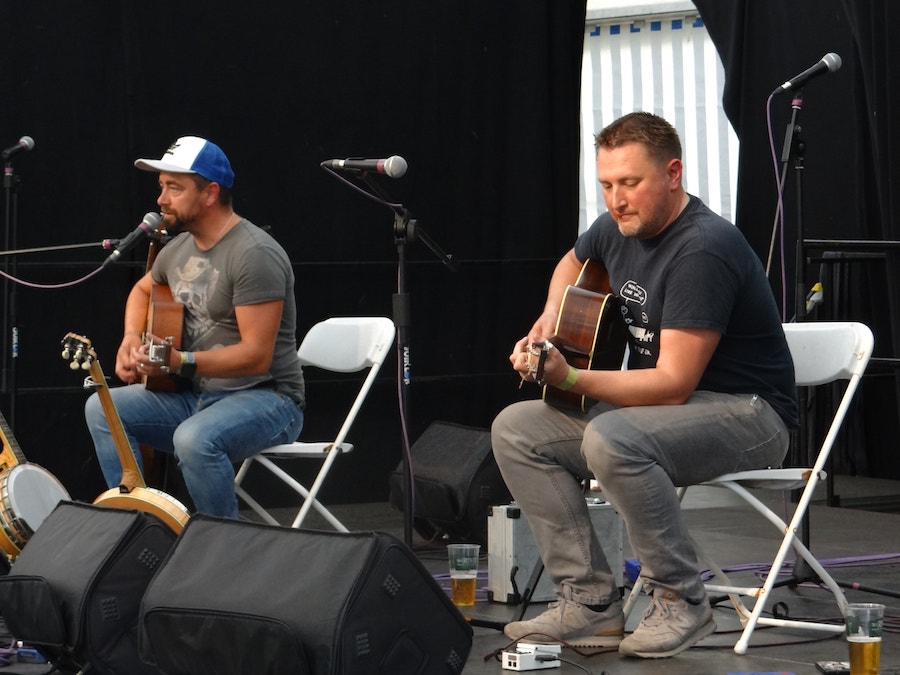
Another “complete package” I caught up with for the first time was Tom Lewis, and for an artist and a reviewer both in their 70s, that must be quite some achievement. Tom is very much a raconteur and a singer and composer of seafaring songs that have already become folk standards. A twenty-four-year career in the Royal Navy provided him with the material, add a touch of uke and squeezebox as accompaniment, and you have an entertainer who instantly grabbed the attention of the Folk Stage audience and kept them in fits of laughter for an hour.
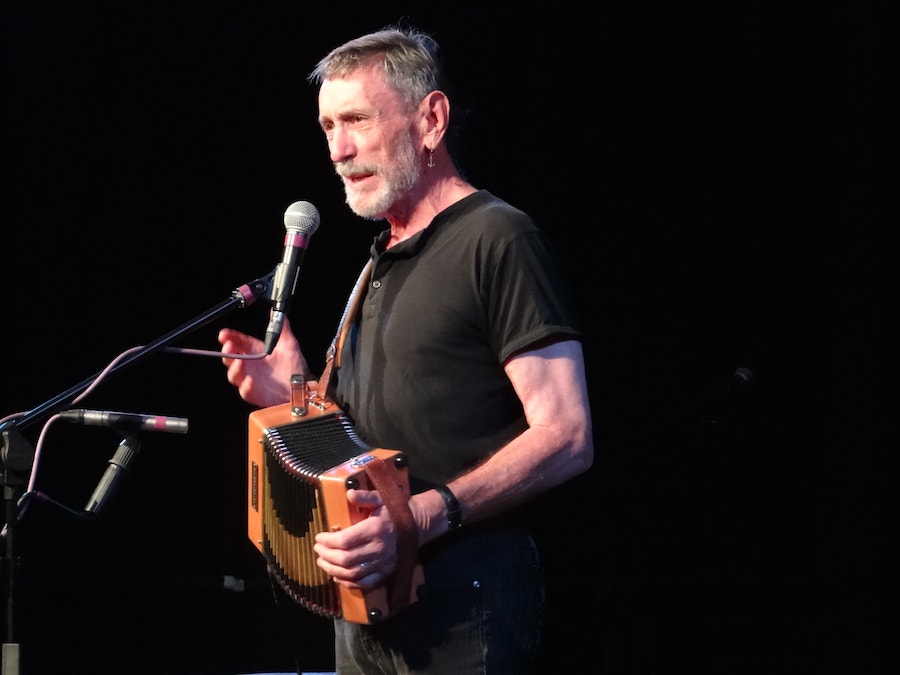
Equally adept at grabbing the attention of an audience is Texas-born Rodney Branigan, with his jaw-dropping ability to play two guitars at once. That’s inevitably the takeaway from Rodney’s shows but don’t ever overlook his song writing and composing talents. If he performed simply as an Americana/Country singer/song writer with his between-song banter, he’d be irresistible, but once you’ve experienced his two guitar fireworks, you really don’t want to lose them. In a similar vein, a typical Track Dogs set will also highlight outstanding Americana tinged song writing abilities and include their own brand of on-stage fireworks, but their similarities end. As a four-piece band, 2 Irish, one English and one American, all based in Madrid, their basket of influences is truly global. Whatever the genre, their four-part harmony vocals can bewitch any audience. Their Friday evening Main Stage set predictably roused the crowd, ensuring their late-night set three hours later kept people up and dancing way past their bedtime.
A rather more relaxing, though no less engaging performance came from The Breath. The duo combines the stunning voice and flute playing of Armagh’s Ríoghnach Connolly with the guitar of Manchester’s Stuart McCallum, both of them now based in Manchester. Their contrasting musical backgrounds, Ríoghnach’s as a folk singer, Stuart’s as a jazz guitarist made for a musically fascinating set while their differing personalities, maybe exaggerated a bit, well it was a performance, boosted the entertainment still further. I’d definitely like to see and hear more of this pairing and may not have too long to wait; they were heading into the studio the following day to begin recording an album.
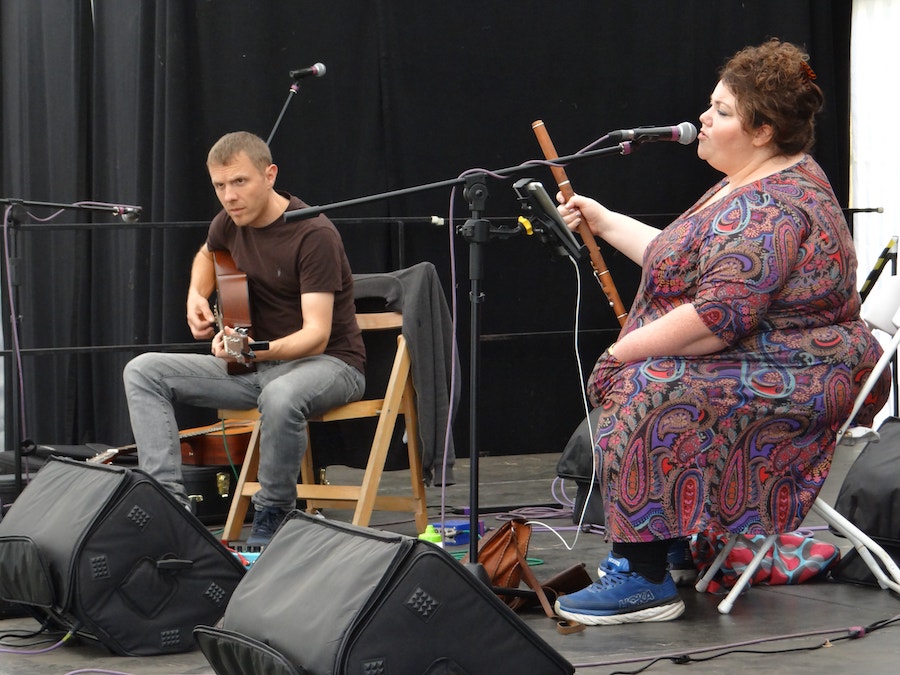
An afternoon tribute concert has become something of a tradition at Southwell, and, following his death in April 2020, John Prine became an obvious choice. The organisation of the afternoon was in the capable hands of Kip Winter and Dave Wilson. They had no shortage of artists wanting to take part, presenting almost two hours of John’s songs. Among them, Blair Dunlop, Alistair Russell, Rodney Branigan, Keith Donnelly, Reg Meuross, The Henry Girls and Nina Zella. Alistair and Keith had been kept active the whole weekend, taking turns to compere the Main Stage and performing their own sets. In Ali’s case, in a duo with accordionist Chris Parkinson and turning one set into a book launch event for his recently published memoir, Can’t Do This On My Own. For Keith, it was two sets for the grownups and one in the Children’s area. On Saturday, Blair Dunlop’s Main Stage set was with his regular bandmates, Jacob JJ Stoney on keys and Fred Claridge on drums.
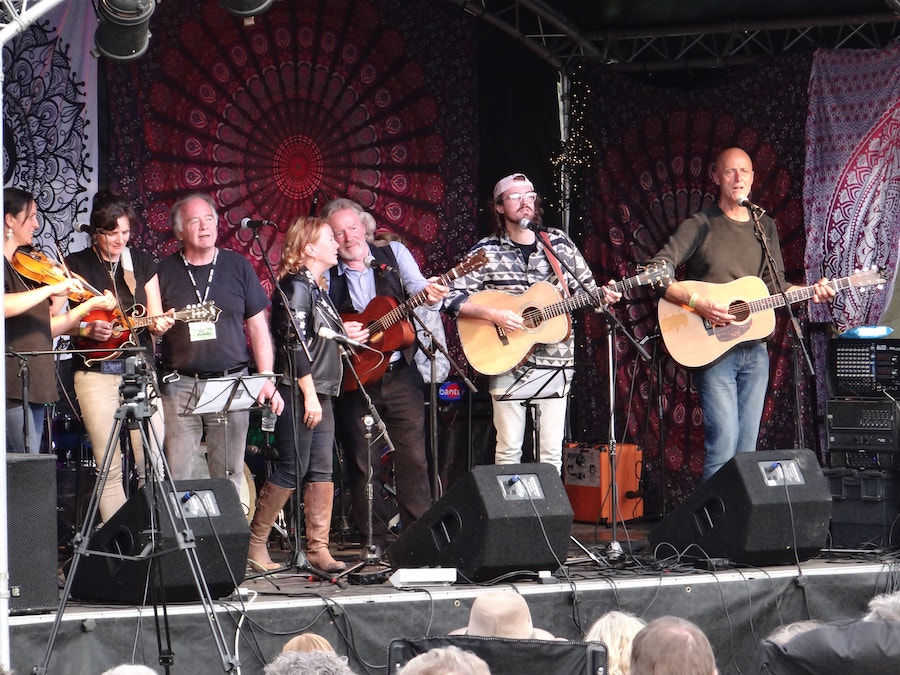
Winter Wilson also had Main, and Folk Stage sets, featuring material from their shortly to be released album The Passing of the Storm. They ended the Prine tribute with as many artists as possible packed onto the Frontier Stage to sing the final song. There was only one song that it could be, Speed of the Sound of Loneliness.
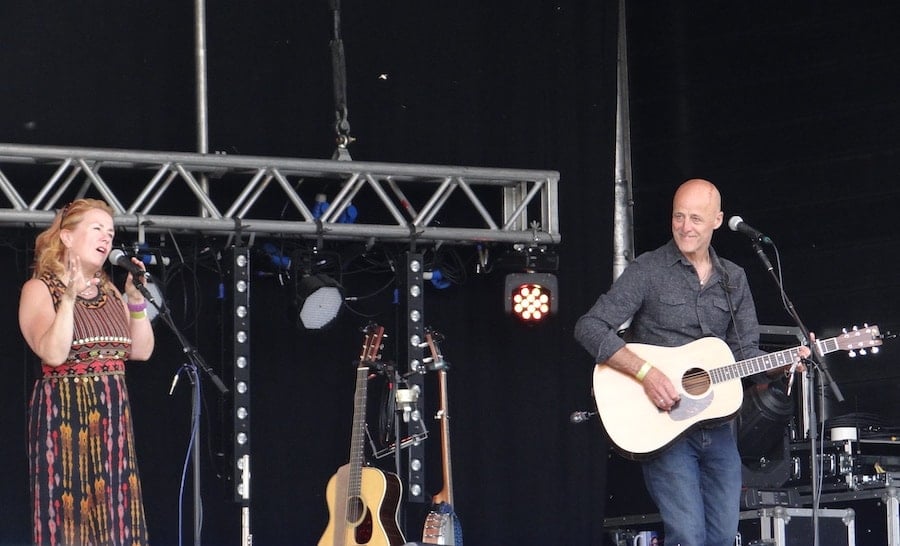
Reg Meuross had a busy time, making three appearances in addition to the Prine tribute. The most fascinating of the three was on stage with Harbottle & Jonas. While prevented from touring for the last eighteen months, the three of them began a remote collaboration. It began with Reg looking back on songs familiar to him from the very early years of his career, a time when traditional songs, rather more than his own compositions, were his stock in trade. Working up voice and guitar versions, he sent them to Dave and Freya with an invitation to add more instrumentation. All three were so pleased with the initial result they’ve ended up with a set of ten songs and christened them Songs of Love and Death. Now recorded, they’re starting to tour them this autumn, with Southwell getting a preview.
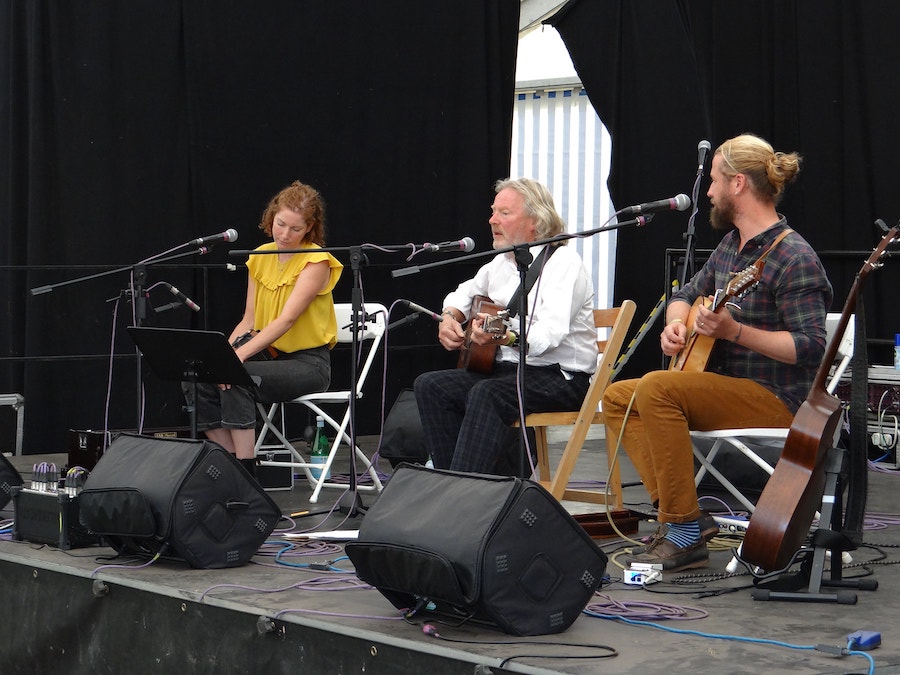
Friday afternoon saw the Frontier Stage turned over to a four and a half hour Emerging Artists Showcase featuring Janice Burns & Jon Doran, Ellie Gowers, Iona Lane Band, Jessie Reid, Amelia Coburn and Rainy Day Woman. All these also performed sets on either the Folk or Frontier stage and, unable to watch the Showcase, I caught as many of these as I could, along with sets from The Last Inklings, intriguingly inventive both lyrically and with arrangements featuring cello and mandolin, and The Wilderness Yet, a well-matched trio featuring the voice of Rosie Hodgson, the fiddle of Rowan Piggott and flute of Philippe Barnes. Particularly memorable from amongst the Showcase artists were Janice Burns & Jon Doran, outstanding harmonising vocals backed by Janice’s mandolin and Jon’s bouzouki and Ellie Gowers, whose strong voice immediately impressed, only to be then joined by admiration for her song writing. Hailing from Warwickshire, she’s been exploring the folklore of her county, writing entertaining, thoughtful songs based on her research. Her songs aren’t all rooted in the past; one of the most memorable arises from her opposition to the HS2 rail line currently being constructed across the county, her song mourning the resulting loss of trees and the habitats they supported.
Tempting as it is to close focus on the optimism we can take from the quality of talent found amongst the younger generation of performers, there are a couple of well-established acts that have so far escaped my spotlight. It would be a travesty not to mention the sometimes acerbic but always well-targeted songs that Chris Wood brings to his performances. Equally, the combination of poignant songs and infectious humour that The Young’uns create will always engage, entertain, and leave an audience with plenty to think about. Their closing set on Saturday night did just that. The 3000 or so people who attended Gate to Southwell Festival 2021 could hardly have wished for more, from the site, from the performers, maybe a bit more from the weather, but it was dry, if a little chilly, and even the sun put in an appearance for the Sunday.
